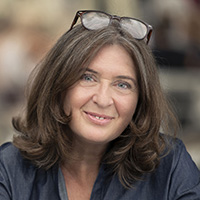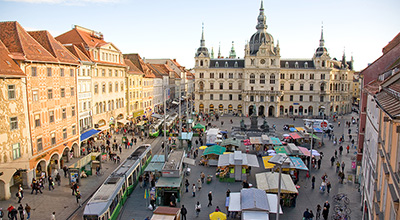My Graz Personal contact with people, with the citizens of Graz, has always been the most important aspect for me, as a local politician. I spend as much time as possible in all parts of the city. I visit people in their homes and hold surgeries. It is important to talk to people face-to-face, to learn about their problems and concerns. I don't need studies to know where the shoe pinches. It's not always just about the big stuff. Small things matter – missing access, noisy neighbours, someone needs a stair lift or some building repairs are overdue. I often inform myself on-site. If there is a conflict, I make sure to hear from both sides. But sometimes the people I meet only want to chat or get their concerns off their chests. Because I’ve lived all my life in Graz I enjoy being a local politician. I have a special empathy with Gries, a working-class district where I grew up. I understand the people who live there, I know the shops, pubs and cafés they go to. Every corner of the district brings back memories. Of course, after many years in local politics, I’ve also got to know all other districts of Graz. Because of lower rents, students and families from abroad have moved into the former traditional working-class areas of Gries and Lend. The river Mur no longer divides Graz into working- and middle-class areas. Increased social diversity creates a greater sense of community, which is good for the city. Becoming mayor In the hours after the results of the municipal elections in 2021 came through, many thoughts went through my mind. Who would have thought that I would be the first woman to hold the office of mayor of my home town, a city which I love above all others? As an Austrian communist politician, as the daughter of a locksmith? Certainly, nobody could have imagined it when I grew up on the Triester housing estate, where, at that time, some people still lived in pre-fabs. I certainly didn't. Elected as a city councillor in 1993 was already highly unusual for somebody of my background and politics. Never in my wildest dreams did I see myself as mayor. It felt unreal, sitting in the TV studio and watching the projections increasingly indicating a victory. I told the presenter shortly before being interviewed “That can’t be right, there must be a mistake.” My reaction caused some journalists understandably to doubt my willingness to want to become mayor. But they were wrong. I always wanted to take on responsibility. I simply hadn’t expected such enormous support from voters. Being mayor When I started my term as mayor in November 2021, I quickly realised what a great responsibility I had taken on, particularly in difficult times. But I knew what it meant to jump in at the deep end. The early months meant very much learning by doing. We politicians often believe or pretend to know about everything. Once I was invited to an anniversary event at the Graz Institute for Space Research, and I had no idea what I could say. There were high-ranking scientists in the audience, including the future Nobel Prize winner Anton Zeilinger, who gave his speech ahead of me. What on earth could I contribute? I then realised that I shouldn’t try to explain anything but to honour their work by being curious and understanding. Not even in politics, do I presume to know or be able to explain everything. But I do know that the issues we have been dealing with for years such as housing, employment, social justice, childcare, and education are the basics in everybody’s life. They have always been the priorities of my political friends and myself. Politicians should not promise what is impossible to achieve within four or five years. It is one of the worst things they can do, not only for themselves but also for their constituency, be it country, region or city. Unrealistic and false promises undermine the credibility of politics and damage democracy. If you disappoint people too often, you destroy their trust. Since becoming Mayor of Graz, my style and the way I deal with people have not changed despite having to carry out new and additional tasks and duties. I would never contemplate retreating into a political ivory tower. I will continue to be approachable to my fellow citizens. If, on a bus, somebody comes up to me to speak about a council flat I note down the telephone number to arrange an appointment. My mobile phone number, which was prominently displayed on my campaign posters, is still in the telephone directory. I also answer all calls personally. It would never occur to me to do it any other way. I just can’t imagine carrying out my work without direct contact with the women and men of Graz. It just wouldn’t be my style of politics. Together we are Graz Today, we often forget what previous generations had to go through. The suffering and feeling of hopelessness they had to overcome. Sometimes, young people tell me how depressed they are about the future. They ask: Will the world ever be worth living in again? Is it still responsible to bring a child into this world? I understand their concerns. Much of what is happening is worrying. There is nothing to gloss over. We all can see the problems with our own eyes and suffer them every day. But it would be wrong to become absorbed in our doubts and fears. It is also irresponsible for politicians to use people’s uncertainties for their ends. I remain positive. My message for my city is “Together we are Graz”. My city will have a glorious future if we stop labelling and categorising people. Unfortunately, the creation of bogeymen and the pitting of people against each other are far from over. On the contrary, trains of thought of this kind flourish in an environment of insecurity, lack of prospects and marginalisation that affects many people around the world today. Many have turned their backs on democracy. This should be an alarm signal for us all and at the same time an obligation to do everything possible to ensure that people are not humiliated and belittled. It doesn't matter where someone comes from or what they believe in. Particularly in difficult times, it is important for people who serve the public, like I do, to help those who cannot help themselves to live a fulfilling life. This includes providing the best possible support to anyone who finds themselves in distress. Common values We all need and are entitled to human rights, an intact environment, education and work. And above all, we must strive for peace. Unfortunately, today, as we all know and see, living in peace cannot taken for granted. We urgently need a disarmament of weapons, but also of language. It is important to talk to each other openly, to listen to one another, to respect other opinions and not to be righteous. But in a city like Graz, with people from more than 160 nations with all their differences, we also need to agree on shared values. To coexist, to shape a common future we must walk together. It is possible if we all make an effort. We should be confident and grasp the opportunities we have to realise a better world right where we live. The global dimension of many of our problems may seem overwhelming and give us a feeling of powerlessness, but we can always focus on what is closest to us, our people, our nature, our economy, cohesion, sustainability and regionality. Then the feeling of powerlessness disappears, then we see how much we can do, and by doing, the fears and feelings of powerlessness also disappear. Local is global I am the mayor of the City of Graz and for me, it is the most wonderful job in the world, but I am still only a small local politician. In the context of great international power play, this is nothing. At the same time, it is a great deal. Because only where we live can we implement change and shape the world. Elke Kahr's pages: Elke Kahr wins World Mayor Prize | Essay by Elke Kahr | Commendations for Elke Kahr | In conversation with Elke Kahr | Essays by: Mayor of Dover | Mayor of Graz | Bürgermeisterin von Graz | Mayor of Greifswald |Oberbürgermeister von Greifswald | Mayor of Oliveri | Sindaco di Oliveri | Mayor of Quelimane | Mayor of Utrecht | Burgemeester van Utrecht | For your information: The World Mayor Project, organised by the philanthropic City Mayors Foundation since 2004, has no connection with any city or organisation and is run on strictly non-commercial lines. Sponsorships, advertising, subscriptions, donations or any other kind of revenue are NOT sought and will be rejected, if offered. Privacy: All personal information you provide us with will be treated in strict confidence. Your email addresses will NOT be passed on to any third parties. Also, we do NOT collect data by cookies or other hidden means. Please contact us if you have any further questions. Please insert 'World Mayor 2023' in the subject line of any email. © Copyright: All content of the City Mayors and World Mayor websites is protected by worldwide copyright. Please contact us if you wish to use any material from the City Mayors, World Mayor or Women Mayors websites. |
||||||||||||||||||||||||
|




